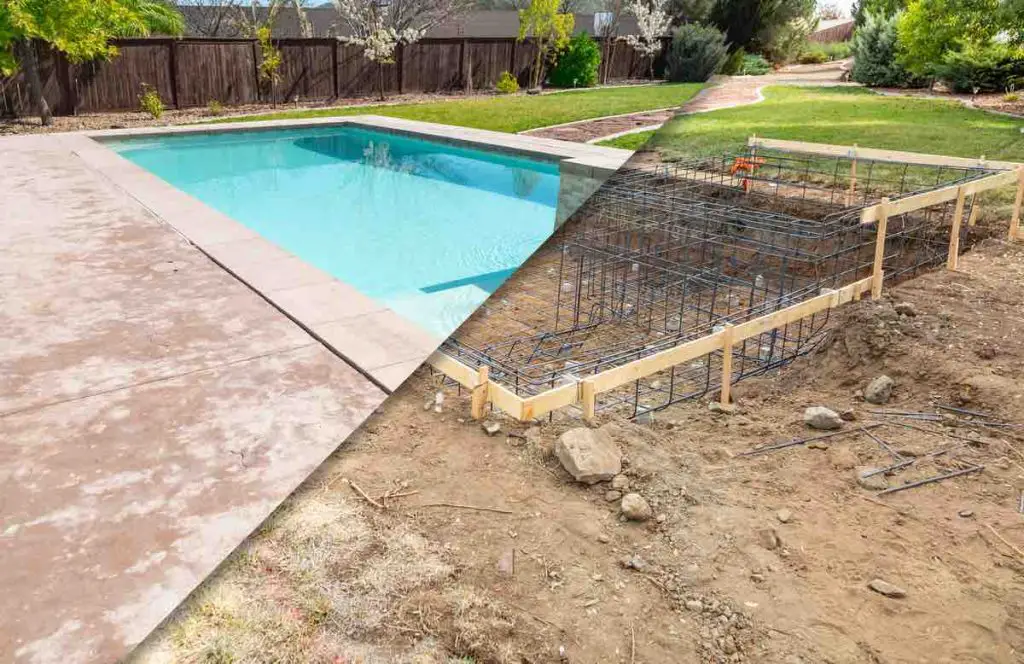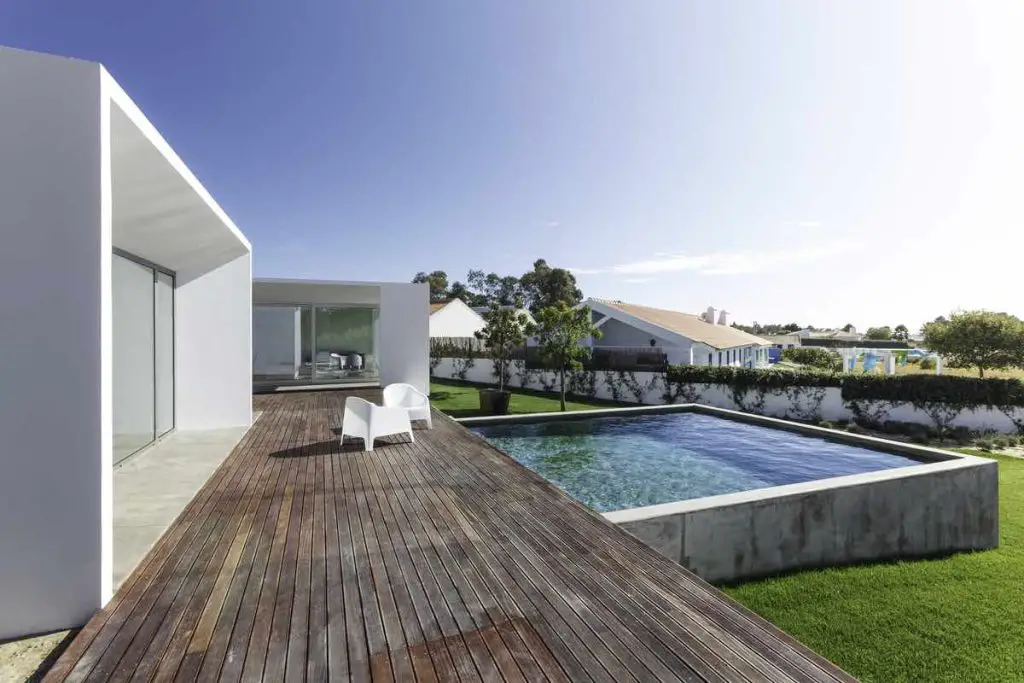Vinyl pools are quite popular, but some of them are much more durable than others. You might’ve seen in-ground vinyl pools surrounded by concrete walls. These walls provide support and stability. However, they’re not the only material used to hold a vinyl pool and prevent it from spilling, sliding, or shifting.
Vinyl pools don’t always have concrete walls. Concrete is a common choice for in-ground vinyl pools, but above-ground vinyl pools often use steel and aluminum walls. They also use inflatable vinyl rings that don’t require additional support. Concrete is the strongest option for vinyl pools, though.
Throughout this article, we’ll dive into the details of why some vinyl pools have concrete walls, what these pools are made of, and what people put under them for additional structural support.

Do Vinyl Pools Have Concrete Walls?
Vinyl pools have concrete walls because they provide optimal stability and visual appeal. Concrete walls look great and take away from the cheap inflatable pool appearance that many people associate with vinyl liners. Adding concrete walls around a vinyl pool undoubtedly elevates it to a luxurious experience.
Pool World shows high-end concrete walls can make your vinyl liner pool last for several decades. The pool’s walls are equally as important as the primary liner material. For example, you could have a vinyl liner last for multiple decades with concrete walls, but it likely won’t make it more than a few years with inflatable walls.
Another reason so many people prefer concrete walls for their vinyl liner pools is that they can have built-in steps and slides that provide seamless support. However, concrete isn’t the only material used to stabilize vinyl liners.
Now, if you want to use vinyl pool liners for their cost-effectiveness but prefer a different look, I’ve got you covered. I’ve written a complete guide on how to give a gunite look to your vinyl pool. Read it by clicking on the link.
What Are Vinyl Pool Walls Made Of?
Vinyl pool walls are made of concrete, aluminum, steel, inflatable vinyl, and polymer. Each material offers varying levels of durability, affordability, flexibility, and touch. Choosing the right wall material for your vinyl pool can make a world of difference since it changes the way you maintain your swimming pool.
Let’s take a look at all five of these materials:
- Concrete: Concrete walls are often found around in-ground vinyl pools. In fact, it’s almost impossible to use concrete walls for an above-ground swimming pool. These walls provide immense support when they’re surrounded by compacted soil or rebar. They last much longer than most other vinyl pool walls.
- Aluminum: Aluminum is a popular choice for vinyl pools that require flexibility. If you have an above-ground vinyl liner and there are a lot of people swimming in it, you’ll need something that can withstand the constantly shifting water. Aluminum holds up to the pressure without getting too rusty. It’s also quite affordable.
- Steel: Steel walls are some of the most durable materials for vinyl liner pools. They’re used for in-ground pools and above-ground pools. Many people use steel walls for partially in-ground pools with the shallow end above the surface and the deep end under the surface. They’re a bit pricier than aluminum, but the durability is worth it.
- Inflatable Vinyl: Inflatable vinyl liners are exclusive to above-ground pools. They’re the cheapest alternative, but they’re also extremely fragile. You’ll save a lot of money compared to concrete walls, but a thorn can ruin everything. Anything sharp around an inflatable liner wall has the potential to destroy the pool.
- Polymer: Polymer walls are the least common material for vinyl liner pools. However, they’re relatively new, so there’s plenty of room for growth. Latham Pool explains that polymer pools provide long-term reliability, durability, and overall support for vinyl liner pools. They’re perfect for in-ground or above-ground vinyl liners.
Vinyl pool walls shift with the soil below them. If your soil is loose and not compact enough, it doesn’t matter what the walls are made of; they’re bound to move around too much. Shifting pool walls crack, causing expensive damage. Read on to learn about what materials lie underneath vinyl pool walls to keep them in good condition.
What Is Underneath a Vinyl Liner Pool’s Walls?
Sand, concrete, foam pads, or dirt are usually underneath a vinyl liner pool’s walls. Much like the wall’s materials, the substance under the walls has a massive impact on the swimming pool. If you have high-quality walls and low-quality materials below the walls, your vinyl liner will eventually encounter numerous structural problems.
Here’s a description of each of these materials:
- Sand: Many pool companies pool sand under vinyl liners because it supports the pool without being too rigid. Sand can move around if something hard hits the bottom of the pool or bumps into the wall. In the Swim explains sand also prevents leaks by limiting the impact of blunt objects.
- Concrete: Concrete typically only goes under above-ground vinyl liners. However, some pool builders put concrete with rebar under in-ground vinyl liners because the owners might eventually want to switch to a gunite swimming pool. This material is rock solid and pairs very well with steel and aluminum walls.
- Foam: If you have an above-ground swimming pool, foam pads work wonders. They prevent swimming and foot traffic in the pool from wearing down the bottom of the liner. These foam pads also limit the direct pressure on the vinyl liner caused by the walls, especially if the pool is placed on a hard surface (like concrete or rocks).
- Dirt: Unfortunately, a lot of first-time pool owners put their vinyl liner pools on dirt. It’s best not to ever place any swimming pool right on top of the soil because it’s susceptible to shifting and sinking. Instead, place a layer of sand over the soil, then put the pool on top of the sand to stabilize it.

Wrapping It Up
Vinyl pools use numerous materials to support themselves. There are pros and cons to each material, so it’s up to you to decide what’s best for your swimming pool. If you want an in-ground pool, we recommend concrete walls. If you want an above-ground pool, steel and aluminum are the ways to go.
